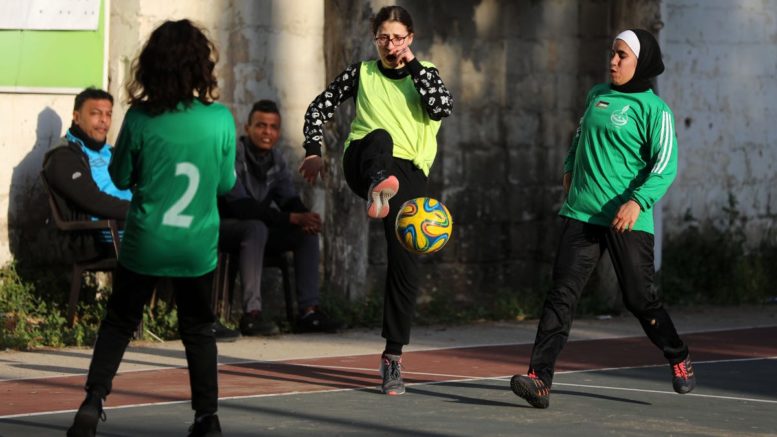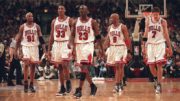“Now, everything is completely gone,” Tamara Awartani tells me of the afterschool programs her organization, Palestine Sports for Life (PSFL), had established in Gaza for young children (especially girls) who otherwise had no access to football or physical education. “I was able to check on one girl in one of our videos . . . she was in another youth center taking care of cats . . . and I was like ‘Oh my God, thank God she’s alive.’ But other children, I’m not able to track.”
Before Palestine and Israel erupted in violence on October 7, 2023, Awartani says, PSFL had l programs in 60 schools in Gaza, with 50 girls in each school taking part in after-school activities and learning football (soccer to those of us in the US), because it was not available in their schools. “And we had so many great stories from them, from their experiences, testimonials, videos . . . But now there is absolutely no perspective, no hope, nothing except grasping to stay alive.”
The importance of sports as development
For young women living in Palestine, even in the best of times, opportunities to play sports were limited, at best. Awartani told Deadspin about her own struggles to participate in sports as a girl in the West Bank. “My mom was always pushing me to take part in different activities because it’s an escape (from) the situation here,” Awartani said. “(Sports) is where one has their own space — it was where I could be who I wanted to be on the court.” Awartani, who was on the Palestinian national swimming and basketball teams, said that, unfortunately, she was unable to take part in many of the scheduled competitions because of the occupation of the West Bank. “We had restrictions on movement. We have limited resources,” she said, explaining that the district she lived in as a child didn’t have an indoor swimming pool, meaning she had to travel from her home to a pool in East Jerusalem. “But even at 14,” she said, “we were held up at checkpoints.”
After getting her MBA at university in Jordan, Awartani returned home to Palestine and became involved in sports as development, an international movement designed to help young women and girls in disadvantaged areas develop confidence, skills and their voices through sports. In 2018, I traveled to Pakistan with the organizations Women Win and Right to Play, to learn and report about sports as development, and can attest firsthand to the difference sports make in the lives of young women, many of whom exist in a culture where women as athletes is a relatively new concept. In Palestine, an escape from the realities of life couldn’t be more needed. “It’s important to get women involved in sports because, as I told you, it was my haven to play,” Awartani said. “It gets your mind off of things that are happening around you and also helps you have hope, something to look forward to, helps you to not get depressed and to have an objective in life.”
Billie Jean King’s Women’s Sports Foundation reported that “girls and women who play sports have higher levels of confidence and self-esteem and lower levels of depression” and that girls who play sports have a more positive body image and better psychological well-being than girls and women who do not play sports. During my brief time in Pakistan, the difference sports made in the lives of young girls was clear. They were louder, less submissive and took up more space than other girls. They carried themselves differently. They seemed outwardly more confident, braver.
Even before Oct. 7, the political realities of the Israeli occupation acted as a barrier to Palestinian children taking part in organized sports. Awartani remembers being held up at a checkpoint by Israeli soldiers so often that she eventually quit the basketball team she played for. “Sometimes I ended up arriving at practice for the last 10 minutes,” she recalls. “I only played one season for them when I was at university because I couldn’t maintain going back and forth to Jerusalem, it was just too much.”
Checkpoints in the way
Awartani wants Westerners to understand the impact that Israeli checkpoints have on the lives of regular Palestinians, pointing out that her people don’t only have to pass through checkpoints when traveling from Palestine to Israel. Some checkpoints, she said, are Palestinian. “Inside the West Bank, we’re talking moving from one (Palestinian) district to another. Palestinian—Palestinian,” she gestured with her hands. “Sometimes there are settlements in the way, of course, but some checkpoints are not that you’re moving from a Palestinian era to an Israeli area. It’s Palestine to Palestine.”
Recently, Awartani told Deadspin, checkpoints are so unpredictable that many parents are reluctant to let their children travel through them. So much “depends on the mood of the soldiers,” she said, “We are talking about an 18-year-old, a 19-year-old (IDF soldier), someone who is not mature, they’re in their own world and they are probably super-stressed because they’re sitting there all day long stressed out thinking . . . so they have this already built-in perspective on who’s passing by at the checkpoint.” Awartani explains that the soldiers check Palestinian papers, but “sometimes the checkpoint just closes. And you have to wait for hours and hours until their mood allows for them to open the checkpoint. And sometimes they just decide to lock it and you have to turn back — but it’s not easy to turn back because there is an island in the middle. So you have to go back to the last (checkpoint) and reverse, reverse, reverse,” she says, shaking her head.
“Once, we had a game in Bethlehem when I was a basketball player and we had to go through a checkpoint,” Awartani recalls. “After that checkpoint, you could either go on to Jerusalem under Israeli control, but we weren’t going there, we were just passing through to Bethlehem, which is also Palestinian. And (IDF soldiers) decided to throw tear gas in the way. And so we got all stuffed up with tear gas in our van and it was a terrible thing leading up to a basketball game.”
Despite all the obstacles she had to overcome, Awartani is determined to bring the same opportunity to other girls in her country. “The perseverance, the patience, the learning. All of these things are life skills you get through being in sports and it helps you in your day-to-day life. It helps you in your work and helps you in school. It helps you with everything.”
The tragedy of refugee camps
In Tulkarm, in Northern Palestine, PSFL operates a football team for young girls living in a refugee camp. “The situation in that refugee camp is very serious, it’s really bad,” Awartani says. “The whole infrastructure was destroyed. The tanks, when they came in, they took up all the asphalt, so now with all the rains — people are really struggling inside the refugee camp. There’s not much space for people,” she told Deadspin. “And, of course, psychologically, being in such an intensive situation, it’s really difficult, so being together in that situation and being able to talk about what has happened to them, to hold each other, to support each other, be with the other girls, to know what is happening and to make sure that they are able to support (each other) psychologically is really important.”
Awartani says many of the girls in PSFL program are traumatized, especially as a young Palestinian boy recently died in the home of one of the girls on the team. In November, IDF forces raided the town of Tulkarm, killing eight Palestinians. Awartani says the raids in the refugee camp take place every night, further stressing residents. Deadspin reached out to both the Israeli Embassy in the U.S. and the United Nations and the United National Relief and Works Agency for Palestine Refugees, to ask about Awartani’s claims, but neither party responded to our emails.
In Gaza, where the non-profit human rights organization Euro-Med says more than 10,000 children have been killed in bombings and more than 24,000 children have lost one or both parents, Awartani says the situation couldn’t be worse. “In Gaza, everything is down to the road. No schools, no grass, absolutely nothing there. We have our team, who is running psychosocial activities for the children in refugee centers,” she says, telling Deadspin that PSFL is holding activities for about 1,000 children in every remaining school. “Kids just want to be kids. Kids want to play. The school year is over, but there aren’t even schools now. Even if you are not getting killed by a bomb, or shot, people are getting killed by starvation because there’s no food, no water, no fuel, nothing.”
The audacity of hope
Part of what keeps Awartani focused on sports as development, even in the midst of a war, is that she’s seen how it affects the lives of the children in PSFL’s programs. She makes sure that young women get first crack at the programs, but also talks about the job of changing the perspective of young boys, particularly in areas where traditions and cultures don’t allow girls the opportunity to play. Awartani tells Deadspin that PSFL started a community football team for girls in one area. “The coach, she’s also a female football player, started it with one girl, but then we had 20 boys who wanted to join. We started with the boys from the perspective of changing their mindset towards a female — and it was really successful.” Awartani says that some of the girls in the program have now become young leaders and coaches, and they are also coaching boys, changing the stereotypes that some of the boys undoubtedly hold.
Part of PSFL’s mission is to bring sports to areas where children, boys and girls, have little opportunity to engage in recreational activities, and the opportunities differ depending on where in Palestine children live. “It’s extremely different from the West Bank to Gaza,” Awartani explains. “If you are in a city, then you have more opportunities. If you are in a refugee camp, then you only have limited choices in the school,” and even that differs, depending on the refugee camp in question. “It’s not standard in every single area because each area is surrounded by settlements. So safety is a concern. If you live in a village and want to take part in the youth center in that village, it depends if it’s within walking distance, if it’s safe, if you need to go to a city in the same district, do you have to go through a checkpoint? These are all things that we have to really take into consideration. Nothing is standard here.”
Yet, Awartani has seen the positive impact of sports as development on the lives of the children PSFL serves. She told Deadspin that PSFL was able to take a team of girls to Qatar for the Street Children World Cup, which Awartani describes as “a world cup for street children or vulnerable children — refugee children,” and which is documented in the 2023 film I Am Somebody, which is currently being screened in the US. Awartani says for these girls, it was the first time they were able to travel not just out of the country, but out of the district they live in. “It was a whole different experience for them. It opened up the world for them, it was all opened up for them through being part of football,” she says. “They were able to share their culture, learn more about different cultures, to be proud of so many things because there were so many different countries. For them to be able to represent the country and the refugee camp, it was a huge thing.
“And when they came back,” Awartani says, “they changed their whole household because they were able to bring that experience back to show their family, their household, the whole trip through their eyes. These are moments that changed their lives.” Because of the trip to Qatar, Awatani says, other organizations reached out and offered to provide the girls with an English education, making it more possible for them to study abroad someday.
But if the situation remains as it currently stands, there is little hope for the children in PSFL’s programs. “There is no hope of having any games scheduled,” Awartani says. “We are hardly even moving from home to school to work. We take it day by day, and we hope sports opens up the door for everyone.”
Original source here
#Palestine #organization #struggles #children #playing





